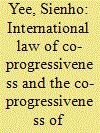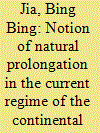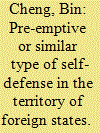|
|
|
Sort Order |
|
|
|
Items / Page
|
|
|
|
|
|
|
| Srl | Item |
| 1 |
ID:
120610


|
|
|
|
|
| Publication |
2013.
|
| Summary/Abstract |
This article investigates whether it is possible and recommendable that corporate criminal responsibility should be introduced for international crimes and that the International Criminal Court should therefore have jurisdiction over legal entities. This article adopts the French proposal on corporate criminal liability, presented during the drafting process of the Rome Statute, as preliminary normative framework, and links this framework with case law of both domestic and international criminal courts in which individual business leaders stood trial on charges of complicity in international crimes. The recurrent question is whether it would have been fair and feasible in those situations to hold the legal entity which these corporate agents were representing criminally responsible as well. The analysis reveals that the answer to this question would undoubtedly have been affirmative. The author argues that the cases which have been investigated represent particularly strong instances of corporate involvement in international crimes. The knowledge and contributions of corporate agents which are required to incur criminal responsibility for complicity in international crimes correspond and correlate with their position of power and control within the corporation, which is necessary to implicate the legal entity.
|
|
|
|
|
|
|
|
|
|
|
|
|
|
|
|
| 2 |
ID:
120608


|
|
|
|
|
| Publication |
2013.
|
| Summary/Abstract |
This Editorial Comment applies the author's concept of the international law of co-progressiveness to civilizations. Civilizations cannot take the place of States but can play the role of promoters of co-progressiveness. The success of this role depends on the progressiveness of a particular civilization and its ability to manage inter-civilizational relations. Three tools for managing inter-civilizational relations are suggested: (1) a "two-men mindedness" attitude when taking action; (2) a Thomas Henry Sanderson lens when perceiving a challenge or disadvantage; and (3) benign competition.
|
|
|
|
|
|
|
|
|
|
|
|
|
|
|
|
| 3 |
ID:
120611


|
|
|
|
|
| Publication |
2013.
|
| Summary/Abstract |
The juridical continental shelf (CS), in terms of Article 76(1) of the United Nations Convention on the Law of the Sea (the LOS Convention), relies for its existence on the presence of a continental margin, which in turn depends on the existence of a natural prolongation. This is the principle expounded by this article, in the light of the provisions of Article 76(1) and (3) of the LOS Convention and other types of evidence of State practice. The prolongation, being geological in nature, is a necessary element underlying any claim to a juridical CS. Thus, in litigations, evidence must be led of its existence in support of such a claim. Even if the degree of influence exerted by the doctrine of natural prolongation upon the entitlement to the juridical CS and the delimitation of that entitlement between opposite or adjacent States are yet to be made clear in practice, the doctrine still has a separate life, of increasing importance, in today's legal regime of the CS. This is said in spite of the International Court of Justice (ICJ) judgment in Libya/Malta that emphasizes the distance criterion in respect of the continental shelf within 200 nm. The International Tribunal for the Law of the Sea (ITLOS) judgment in the recent Bangladesh/Myanmar delimitation case has provided an interesting interpretation of the notion of natural prolongation, and implicitly confirmed the relevance of the notion to the entitlement to the continental shelf in question. The case law in this regard has been significant, but other categories of State practice are also evolving that may underlie a new trend of giving the notion of natural prolongation a renewed, prominent place in this field.
|
|
|
|
|
|
|
|
|
|
|
|
|
|
|
|
| 4 |
ID:
120609


|
|
|
|
|
| Publication |
2013.
|
| Summary/Abstract |
The General Assembly has accorded to Palestine the status of a non-member observer State in the UN. Some commentators have taken the position that Palestine's legal status as a State has thus been confirmed. This article draws on historical examples to demonstrate that the status of non-member State is not necessarily granted only to States. The recent vote in the General Assembly, therefore, neither confirmed nor altered the legal status of Palestine. But irrespective of this vote, Palestine nevertheless has a previously acquired international capacity to act like a State and can, inter alia, become a party to the ICC Statute and possibly bring a case to the ICJ. Such a capacity could be seen as an implicit confirmation of statehood. This article, however, demonstrates that State creation cannot be an implicit side-effect of international treaties or voting procedures in international organizations. Not even (full) membership of the UN is an exception.
|
|
|
|
|
|
|
|
|
|
|
|
|
|
|
|
| 5 |
ID:
120607


|
|
|
|
|
| Publication |
2013.
|
| Summary/Abstract |
In reviewing the legality of pre-emptive self-defense, the question is raised, first, whether there is a case for tightening up the meaning of the term "self-defense" by calling it "legitimate self-defense", on account of its relative ambivalence in ordinary usage. Next, why self-defense in the territory of other States is different from self-defense in other areas is explained. Because the Caroline Incident is often invoked as legitimizing pre-emptive self-defense, and the reasoning of the Nuremberg judgment in one instance appears to support this view, an examination is made of the lessons to be learnt from the Caroline Incident as to the conditions governing self-defense and also of the relevant part of the Nuremberg judgment. The conclusion is that, while the verdict in the case concerned in the Nuremberg judgment is correct, the reasoning is open to question, and the Caroline Incident does not support the case of pre-emptive self-defense.
|
|
|
|
|
|
|
|
|
|
|
|
|
|
|
|
|
|
|
|
|